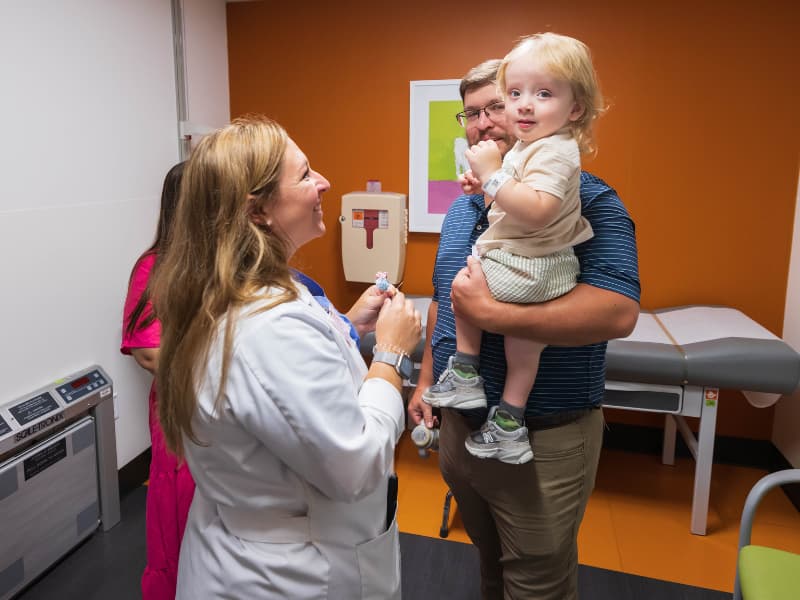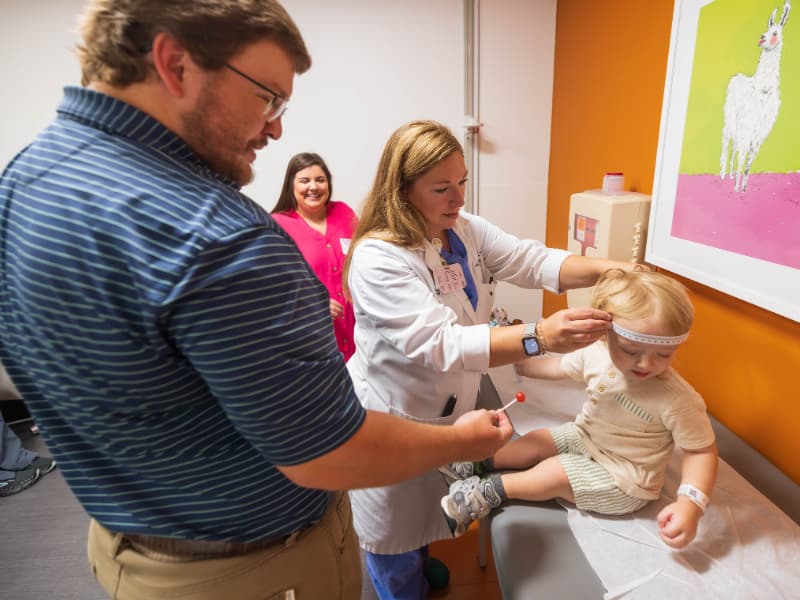2023
- Department of Neurosurgery
- Contact Neurosurgery
-
News
- Department of Neurosurgery News
- 2025
- 2024
- 2023
- 2022
-
2021
- Patient Story: Bradley Hamblin - Brain Tumor
- Patient Story: James Irwin - Childhood Cancer
- Patient Story: Judy Herrington - Stroke
- Patient Story: Kathleen Keeton - Spine
- Patient Story: Lee Roy Nail - Trigeminal Neuralgia
- Patient Story: Patrick Kerns - Aneurysm
- Patient Story: Paul Miller - Pituitary Tumor
- Patient Story: Tamika Larkin-Stowers - Epilepsy
- A Year Later
- New Technology for Minimally Invasive Procedures
- Minimally invasive procedure repairs brain aneurysms at high risk of bursting
- Patient Stories
- About the Department
- Education
- Research
- Support the Department of Neurosurgery
Care for spina bifida patients close to home at Children’s of Mississippi

William Harreld’s care began with intrauterine surgery in Texas to mend an open neural tube, but after birth, he receives treatment from doctors a short drive away at Children’s of Mississippi.
The spina bifida clinic inside the Kathy and Joe Sanderson Tower offers care from pediatric neurosurgeons, orthopaedic surgeons, urologists, physical therapists, psychologists, social workers and experts in pediatrics, orthotics and complex care.
“We’re glad to have our care at the University of Mississippi Medical Center close to home,” said William’s mother, Christy Harreld of Vaughan.
Spina bifida is a neural tube defect that is usually apparent at birth. Babies with spina bifida may have spinal cord and nerve damage because the neural tube has not closed all the way. This can result in mild to severe physical and intellectual disabilities, depending on the size and location of the opening and how it affects the spinal cord and nerves.
“If we know the diagnosis prenatally, depending on the age of gestation, we can counsel parents about their options of prenatal or post-natal closure,” said Dr. Kristin Weaver, assistant professor of neurosurgery and director of the spina bifida clinic. “If not able to be closed prenatally, children with spina bifida should be born here at UMMC so we can quickly assess and manage the diagnosis, which often includes surgery within the first few days of life. If babies are born elsewhere, they are often transferred to UMMC.”

UMMC and its pediatric arm, Children’s of Mississippi, “have a good relationship with pediatric neurosurgeons around the country who perform prenatal closure and will help facilitate referral,” Weaver said.
All other treatments for spina bifida are available at the state’s only children’s hospital, including surgery, physical and occupational therapy and orthotics, she said.
“The goal of our spina bifida clinic is to provide efficient care for all your child’s needs. Spina bifida is a life-long diagnosis, so spina bifida patients will need care throughout their lives.”
Harreld, a sonographer, spotted William’s condition during an ultrasound at 14 weeks’ gestation. Intrauterine surgery at 24 weeks’ gestation was performed at Texas Children’s Hospital in Houston.
“Ours was the 97th time the procedure was performed, so it was still a new procedure,” she said.
Today William is learning to walk and sees specialists in neurology, urology, and orthopaedics at Children’s of Mississippi.

“He’s doing fantastic,” Harreld said.
In the U.S., about 166,000 people have spina bifida. About 1,400 children are born with the condition. While an exact cause of spina bifida is not known, researchers think genetics, nutrition and environmental factors may each play a role.
At every age and stage, children with spina bifida need care for conditions including hip problems, tethered spinal cord syndrome, spinal deformities, weakness and numbness in the legs and feet, and bowel and bladder issues.
“We have formed this multi-disciplinary clinic because our patients are important to us,” Weaver said. “We want to have the appropriate medical professionals educating patients and parents, and to offer the opportunity for comprehensive and excellent medical care.”


